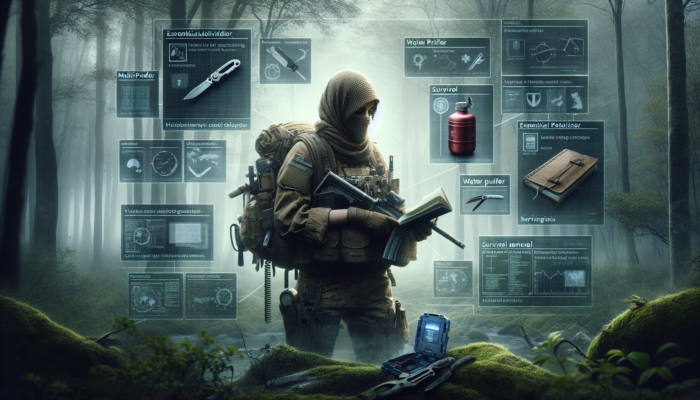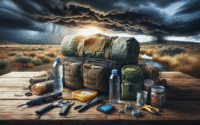Essential Techniques for Crisis Management
S.H.I.T Survival Skills To Learn: Essential Techniques for Crisis Management
Understanding S.H.I.T: Definition and Importance

Essential Techniques for Crisis Management: In the realm of survival, the acronym S.H.I.T encapsulates the essence of preparedness—Survival, Health, Information, and Training. Understanding what S.H.I.T survival skills to learn means is crucial for anyone looking to navigate emergencies with confidence. Whether you’re dealing with natural disasters, urban crises, or unexpected challenges, mastering these skills can make the difference between chaos and calm.
At its core, S.H.I.T’s survival skills are about being proactive rather than reactive. The importance of these skills lies in their ability to empower individuals and communities. When you equip yourself with knowledge and practice, you’re not just preparing for potential crises; you’re fostering a mindset of resilience and adaptability. This is vital because, in high-stress situations, panic can cloud judgement. By understanding S.H.I.T, you position yourself to respond effectively, ensuring not only your safety but also the safety of those around you.
Basic First Aid Knowledge
One of the fundamental components of S.H.I.T survival skills to learn is basic first aid knowledge. In any emergency, the ability to perform first aid can be lifesaving. Imagine you’re in a situation where someone sustains an injury—knowing how to assess the situation and administer care is invaluable. Basic first aid covers a range of scenarios: from treating cuts, scrapes, and burns to performing CPR and managing choking incidents.
Start by familiarising yourself with the essentials: how to clean and dress wounds, the signs of shock, and when to seek further medical help. A first aid kit should be your trusty companion, stocked with bandages, antiseptics, and other necessities. Regular practice through workshops or courses can reinforce your skills and ensure you’re ready when it matters most. Remember, it’s not just about knowing what to do; it’s also about staying calm and focused while you do it.
Mental Preparedness Strategies
Mental preparedness is often underestimated, yet it plays a crucial role in S.H.I.T.’s survival skills to learn. Developing mental resilience equips you to handle the stress and uncertainty that come with emergencies. Techniques such as visualisation, mindfulness, and breathing exercises can significantly enhance your ability to stay calm under pressure.
Imagine being in a high-stress situation, and instead of succumbing to fear, you pause, take a deep breath, and assess your surroundings. This ability to focus can help you make informed decisions. Additionally, creating a mental checklist of steps to take in various scenarios can prepare you to act swiftly and confidently when needed. By bolstering your mental fortitude, you’re not just preparing for survival—you’re cultivating a mindset that thrives even in adversity.
S.H.I.T Survival Skills To Learn: Key Tools and Resources

Must-Have Survival Gear
When it comes to S.H.I.T survival skills to learn, having the right tools on hand is essential. Your survival gear can make a significant difference between a successful escape from danger and a challenging ordeal. Start with the basics: a reliable multi-tool, a water purification system, and a sturdy first aid kit.
Consider your environment and tailor your gear accordingly. If you’re in an urban setting, tools for self-defence and communication might be paramount. In contrast, if you’re venturing into the wilderness, you’ll need items like fire-starting kits, portable shelters, and navigation tools. Always remember to familiarise yourself with how to use each piece of gear effectively; it’s not just about having them but knowing when and how to deploy them.
Navigational Skills and Tools
Navigational skills are a cornerstone of S.H.I.T survival skills to learn. In a crisis, being able to find your way can be critical. While many rely on GPS and smartphones, it’s essential to also understand traditional methods of navigation, such as using a compass and reading maps.
Start by learning the fundamentals of map reading—understanding scales, topography, and landmarks. Practice with a compass by doing exercises that require you to find specific locations based on coordinates. These skills not only boost your confidence but also prepare you for situations where technology fails. With solid navigational skills, you can chart a safe course through unfamiliar terrain, ensuring you remain oriented no matter the challenge.
Emergency Communication Devices

In any crisis, communication is key, and having reliable emergency communication devices is a vital aspect of S.H.I.T survival skills to learn. In a world where cell networks may become overloaded or entirely inoperable, alternative communication methods are essential.
Consider investing in a two-way radio or a satellite phone, which can provide connectivity when traditional methods fail. Furthermore, learning about signalling techniques—like using flares or reflective materials—can help you alert rescuers to your location. Regularly practice these communication strategies with your family or survival group to ensure everyone understands how to use the devices effectively. In the chaos of an emergency, clear communication can enhance coordination and significantly improve survival chances.
S.H.I.T Survival Skills To Learn: Practical Training and Drills
Simulated Survival Scenarios
To truly master S.H.I.T survival skills to learn, engaging in simulated survival scenarios is invaluable. These realistic drills allow you to practice your skills in a controlled environment, providing an opportunity to learn from mistakes without the stakes of a real crisis.
Organise or participate in survival workshops that include scenario-based training. These can range from first aid simulations to wilderness survival challenges where you must navigate and forage for food. The key is to replicate high-stress situations as closely as possible, allowing you to experience the pressure while honing your skills. After each drill, take time to debrief—discuss what worked, what didn’t, and how you can improve for next time. This reflective practice is essential for growth and preparedness.
Outdoor Survival Courses
Professional outdoor survival courses can be a game changer in your journey of S.H.I.T survival skills too. These courses, often taught by experienced instructors, provide hands-on training in various survival techniques. From building shelters to foraging for edible plants, these courses offer invaluable insights that you may not find in books or online tutorials.
Look for courses that suit your skill level—some may cater to beginners, while others might focus on advanced techniques. The immersive experience of learning in the wild helps reinforce your skills and builds confidence. Plus, connecting with like-minded individuals can foster a sense of community and support in your survival journey.
Regular Skill Reinforcement
To ensure that your S.H.I.T survival skills remain sharp, regular skill reinforcement is crucial. Just like any other skill, survival techniques can fade without practice. Establish a routine of revisiting your skills every few months.
Set aside time to practise essential skills, whether it’s setting up a tent, starting a fire, or navigating with a map and compass. Engage friends or family in these practices to make it a fun and collaborative effort. Additionally, consider creating a personal survival challenge that encourages you to push your limits and discover new techniques. Continuous reinforcement not only keeps your skills fresh but also builds confidence in your ability to handle unexpected situations.
S.H.I.T Survival Skills To Learn: Adapting to Different Environments
Urban Survival Tactics
Urban environments present unique challenges when it comes to survival, making urban survival tactics a crucial aspect of S.H.I.T survival skills to learn. In a city, the hustle and bustle can quickly turn into chaos during a crisis. Understanding how to navigate crowded spaces, secure resources, and maintain safety is essential.
Begin by developing situational awareness—know your surroundings and identify potential hazards. Create a mental map of your city that includes safe zones and resource points, such as hospitals and police stations. Familiarise yourself with alternative routes for evacuation. Additionally, learn how to blend in and avoid drawing attention to yourself, especially in heightened situations. By mastering these urban survival tactics, you equip yourself with the knowledge needed to thrive when the unexpected occurs.
Wilderness Survival Techniques
For those venturing into nature, wilderness survival techniques are a fundamental component of S.H.I.T survival skills to learn. The wilderness can be unforgiving, but with the right knowledge, you can transform it into a place of refuge rather than fear.
Begin with the basics: learn how to build a shelter using natural materials, start a fire without matches, and identify edible plants and wildlife. Understanding how to source clean water is also critical; familiarise yourself with methods of purification using natural resources. Furthermore, practising these techniques in real-world scenarios helps reinforce your skills and builds confidence. The wilderness is a classroom filled with growth opportunities, and embracing its challenges can elevate your survival abilities.
Coastal and Marine Survival
Coastal and marine environments come with their own set of challenges, making it essential to understand the unique skills required for survival in these settings. Whether you’re facing a storm at sea or a natural disaster along the coast, knowledge of marine survival is a vital aspect of S.H.I.T survival skills to learn.
Start by learning how to read tides, currents, and weather patterns. Familiarise yourself with basic boating skills and safety equipment. In addition, understanding coastal foraging can provide valuable food sources. Practising survival techniques in coastal conditions will prepare you for the unexpected. Whether it’s building a makeshift raft or signalling for help, mastering these skills increases your chances of survival in marine scenarios.
S.H.I.T Survival Skills To Learn: Building a Survival Mindset
Cultivating Resilience and Adaptability
A robust survival mindset begins with cultivating resilience and adaptability, key elements of S.H.I.T survival skills to learn. In any crisis, the ability to bounce back from setbacks and adjust to new circumstances is invaluable. Resilience isn’t just about physical strength; it’s about maintaining a positive outlook and finding solutions even when faced with adversity.
Practice mental exercises that challenge your ability to adapt. This might include scenario planning—imagining various crises and how you would respond. Additionally, embrace challenges in your daily life that push your limits, such as public speaking or outdoor adventures. Each step you take builds your resilience, preparing you mentally for the unexpected.
Overcoming Fear and Panic
Fear can be paralysing, especially in a crisis. Learning techniques to manage fear and panic is a fundamental aspect of S.H.I.T survival skills to learn. The first step is acknowledging that fear is a natural response; it’s how you choose to react that matters.
Utilise breathing techniques and grounding exercises to anchor yourself in the moment. When faced with panic, focus on your breath—inhale deeply, hold for a moment, and exhale slowly. This practice calms the nervous system and helps regain control. Additionally, consider visualisation techniques, where you imagine a successful outcome in a challenging situation. By regularly practising these techniques, you’ll develop a toolkit to draw on when fear threatens to overwhelm you.
Maintaining Hope and Motivation
In the darkest moments of a crisis, maintaining hope and motivation is critical. This is a vital component of S.H.I.T survival skills to learn. Hope fuels resilience; it empowers you to keep moving forward even when the odds seem stacked against you.
Set small, achievable goals during challenging times to foster a sense of accomplishment. Celebrate each victory, no matter how minor, as it reinforces your motivation. Surround yourself with positive influences, whether through community support or inspirational literature. Additionally, practise gratitude, focusing on what you have rather than what you’ve lost. This shift in perspective can illuminate pathways to resilience, helping you maintain hope amid adversity.
S.H.I.T Survival Skills To Learn: Community and Teamwork
Importance of Team Dynamics in Survival
In the realm of survival, teamwork can significantly enhance your chances of success. Understanding the importance of team dynamics is a crucial aspect of S.H.I.T survival skills to learn. In a crisis, working together can streamline decision-making and resource allocation, leading to more effective outcomes.
Establish clear roles and responsibilities within your survival group. Everyone should understand their strengths and how they contribute to the team’s overall effectiveness. Regular team practice fosters camaraderie and builds trust, allowing for smoother coordination during emergencies. Additionally, develop communication strategies that ensure everyone is on the same page when it matters most.
Building a Survival Community
Creating and maintaining a supportive survival community can significantly bolster your preparedness efforts. A community focused on survival equips its members with diverse skills and knowledge, enhancing the overall capability of the group. Start by connecting with like-minded individuals, whether through local meet-ups, online forums, or community events.
Organize regular training sessions or workshops where members can share their expertise and learn from one another. Establishing a network of support not only prepares you for emergencies but also fosters social cohesion. When faced with a crisis, knowing that you have a community to rely on can provide immense comfort and strength.
Effective Communication in Emergencies
Mastering communication skills is essential for coordinating effectively during a crisis. The ability to convey information clearly and efficiently can save lives, making it a critical component of S.H.I.T survival skills to learn. Practice active listening—ensure that you understand what others are saying and encourage open dialogue within your survival group.
Develop a communication plan that includes signals, codes, and designated meeting points. Additionally, ensure that all group members are familiar with the plan and have practised it regularly. In emergencies, clear communication reduces confusion and enhances coordination, allowing your group to respond more effectively.
S.H.I.T Survival Skills To Learn: Long-Term Preparedness
Stockpiling Essential Supplies
Long-term survival begins with stockpiling essential supplies. Understanding how to effectively gather and store food, water, and other necessities is a vital aspect of S.H.I.T survival skills to learn. Start by creating a comprehensive list of items you’ll need, including non-perishable food items, clean water, and hygiene products.
Consider the shelf life of your supplies and rotate them regularly to ensure freshness. Additionally, learn about sustainable practices such as gardening and water collection that can supplement your stockpile. Regularly assess your supplies and adjust based on changing needs and circumstances. By being proactive in your stockpiling efforts, you lay a solid foundation for long-term survival.
Sustainable Living Practices
Embracing sustainable living practices is crucial for ensuring long-term survival and resource management. This aspect of S.H.I.T survival skills to learn focuses on minimising your environmental impact while maximising your resources. Start by incorporating practices such as composting, rainwater harvesting, and permaculture gardening into your daily life.
Educate yourself on how to reduce waste and recycle materials effectively. Understanding how to live harmoniously with nature not only prepares you for potential crises but also fosters a sense of responsibility towards the environment. As you adopt sustainable practices, you contribute to a healthier planet while enhancing your survival capabilities.
Planning for Different Scenarios
Developing comprehensive plans for various potential survival scenarios is essential for effective preparedness. This part of S.H.I.T survival skills to learn involves considering various emergencies—natural disasters, economic collapse, or social unrest—and creating tailored action plans for each.
Start by assessing the specific risks in your area and developing contingency plans. This may include evacuation routes, emergency contacts, and resource allocation strategies. Regularly review and update your plans to ensure they remain relevant. By planning for different scenarios, you increase your confidence and readiness to face whatever challenges may arise.
S.H.I.T Survival Skills To Learn: Legal and Ethical Considerations
Understanding Survival Laws and Regulations
Navigating the legal landscape of survival is a crucial aspect of preparedness. Understanding survival laws and regulations is essential for ensuring compliance and avoiding legal issues during a crisis. Familiarise yourself with local laws regarding self-defence, hunting, and foraging.
Additionally, be aware of land ownership and trespassing laws, especially if you plan to access natural resources. Staying informed about legal aspects allows you to focus on survival without the added stress of potential legal repercussions. Consider consulting legal experts or local authorities for guidance, ensuring you remain compliant while navigating survival situations.
Ethical Decision-Making in Crisis
Ethical decision-making becomes vital during survival situations, and understanding the moral implications of your choices is essential. This aspect of S.H.I.T survival skills to learn encourages you to consider the well-being of others while prioritising your survival.
Engage in discussions about ethical dilemmas you might face in a crisis, such as resource allocation or self-defence. Developing a personal code of ethics can help guide your decisions when the stakes are high. By fostering a sense of responsibility towards others, you create a supportive environment that enhances the survival of the community as a whole.
Respecting Nature and Others
Survival is not just about personal safety; it’s also about respecting nature and others in the process. Understanding how to coexist with the environment and fellow beings is a crucial aspect of S.H.I.T survival skills to learn. By adhering to the principles of Leave No Trace, you can minimise the impact of your presence on the environment.
Additionally, fosters a sense of community and cooperation with others during crises. Recognize that while survival instincts may kick in, maintaining respect for the environment and fellow survivors is key to fostering a culture of support and collaboration. By prioritising respect, you contribute to a more sustainable and compassionate approach to survival.
S.H.I.T Survival Skills To Learn: Advanced Techniques and Specializations
Specialized Survival Skills for Extreme Conditions
When it comes to S.H.I.T survival skills to learn, specialised skills for extreme conditions are essential for those venturing into challenging environments. These skills might include advanced snow survival techniques for winter conditions or desert survival strategies for arid climates.
Invest time in learning about the specific challenges posed by extreme weather. For instance, understanding how to build a snow cave, manage hypothermia, or navigate dunes can significantly enhance your chances of survival. Additionally, seek out training from experts who specialise in these environments, as they can provide valuable insights and hands-on experience. Embracing these specialised skills prepares you for the unexpected in even the harshest conditions.
Learning from Survival Experts
One of the best ways to enhance your S.H.I.T survival skills is by learning from seasoned survival experts. These individuals have often faced real-life challenges and have the experience to back their knowledge. Seek out workshops, seminars, or books authored by renowned survivalists to gain insights into their techniques and philosophies.
Engage with these experts through online forums or local survival groups to ask questions and share experiences. The lessons learnt from those who have walked the path can provide invaluable guidance and inspiration for your survival journey. Remember, every expert was once a beginner, and their journeys can illuminate the way for you.
Incorporating Technology in Survival
In our fast-paced world, technology plays a significant role in enhancing S.H.I.T.’s survival skills to learn. From GPS devices to mobile apps designed for emergency preparedness, technology can provide crucial support during crises. Familiarise yourself with various tools that can assist in navigation, communication, and resource management.
However, it’s important to remember that technology should complement your skills, not replace them. Always have a backup plan in case devices fail—this may include traditional navigation methods or communication strategies. By understanding how to effectively integrate technology into your survival toolkit, you enhance your preparedness while remaining adaptable to changing conditions.
FAQs
What are S.H.I.T survival skills?
S.H.I.T survival skills refer to essential preparedness techniques encompassing survival, health, information, and training needed to navigate emergencies effectively.
Why is first aid knowledge important in survival?
Basic first aid knowledge allows you to handle injuries and health emergencies effectively, increasing your chances of survival in crises.
How can I improve my mental preparedness for emergencies?
Practising mindfulness, visualisation techniques, and stress management strategies can enhance mental preparedness and resilience in emergencies.
What essential gear should I have for survival?
Key survival gear includes a multi-tool, first aid kit, water purification system, and communication devices tailored to your environment.
Why are navigational skills crucial in survival?
Navigational skills allow you to find your way in unfamiliar terrain, ensuring you can safely escape dangerous situations.
How can I build a survival community?
Connect with like-minded individuals through local groups or online forums, and organise training sessions to foster a supportive survival community.
What are some sustainable living practices for long-term preparedness?
Incorporating practices like composting, rainwater harvesting, and gardening can enhance long-term sustainability and resource management.
How can I manage fear during a crisis?
Utilising breathing techniques, grounding exercises, and visualisation can help manage fear and panic effectively in high-stress situations.
What ethical considerations should I keep in mind during survival situations?
Understanding the moral implications of your actions, such as resource allocation and respect for others, is crucial in crisis scenarios.
What are advanced survival techniques for extreme conditions?
Advanced survival techniques may include specialised skills for navigating extreme weather, such as building snow caves or managing desert conditions.



